Basic Electronics
Harvard University
Pagina 2 van de 26 resultaten
Sorteer op
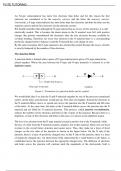
-
Diode law
- College aantekeningen • 5 pagina's • 2024
-
peterkuria3
-
- $8.29
- + meer info
Diode Law describes the current-voltage relationship in a diode, governed by the Shockley equation. It states that the current through a diode exponentially increases with forward voltage and remains minimal in reverse bias. This law is fundamental for understanding diode behavior in rectifiers, signal modulation, and voltage regulation applications.
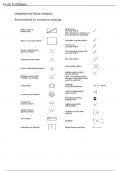
-
COMMON ELECTRICAL SYMBOLS
- Samenvatting • 1 pagina's • 2024
-
peterkuria3
-
- $3.99
- + meer info
Common electrical symbols represent components in circuit diagrams. Key symbols include resistors (zigzag lines), capacitors (parallel lines), diodes (triangle and line), transistors (circles with arrows), and ground (line with three descending lines). These symbols standardize circuit representation, simplifying analysis, communication, and construction of electrical systems.
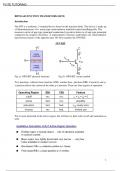
-
BIPOLAR JUNCTION TRANSISTORS
- College aantekeningen • 8 pagina's • 2024
-
peterkuria3
-
- $9.49
- + meer info
Bipolar Junction Transistors (BJTs) are semiconductor devices with three layers: emitter, base, and collector. They function by controlling current flow through two p-n junctions. BJTs operate in two modes: NPN and PNP, defined by their doping types. They amplify current, making them essential in switching and amplification applications. Understanding BJTs is crucial for designing and analyzing circuits in amplifiers, oscillators, and other electronic devices.
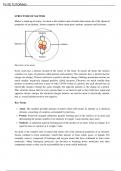
-
BASIC ELECTRONICS
- College aantekeningen • 15 pagina's • 2024
-
peterkuria3
-
- $9.49
- + meer info
Basic electronics involves the study and application of electrical components and circuits. It encompasses understanding components like resistors, capacitors, diodes, and transistors, and their functions in circuits. Fundamental principles include Ohm's Law, Kirchhoff's Laws, and the behavior of AC/DC currents. Basic electronics forms the foundation for designing, analyzing, and troubleshooting electronic devices and systems, crucial for advancements in technology and everyday electronic appl...
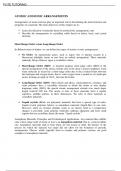
-
Atomic and Ionic arrangement
- Samenvatting • 7 pagina's • 2024
-
peterkuria3
-
- $9.49
- + meer info
Atomic and ionic arrangements refer to the specific organization of atoms and ions in a material. Atomic arrangement involves atoms forming structured patterns, often in crystalline lattices, affecting properties like conductivity and strength. Ionic arrangement, found in ionic compounds, consists of alternating positive and negative ions in a regular pattern, maximizing attractive forces and minimizing repulsive ones. These arrangements critically influence the physical and chemical properties ...
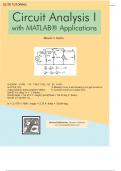
-
Circuit Analysis I
- College aantekeningen • 592 pagina's • 2024
-
peterkuria3
-
- $7.99
- + meer info
Circuit analysis involves examining and solving electrical circuits to determine the current, voltage, and power at various points in the network. This process uses principles like Ohm's Law, Kirchhoff's Laws, and theorems like Thevenin's and Norton's to simplify and understand complex circuits. It is crucial for designing and troubleshooting electrical systems.
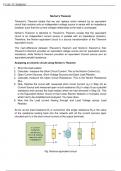
-
Norton Theorem
- Samenvatting • 8 pagina's • 2024
-
peterkuria3
-
- $10.49
- + meer info
Norton's Theorem states that any linear electrical network with voltage and current sources can be simplified to a single current source in parallel with a single resistor. This simplification makes analyzing and understanding complex circuits easier by converting them into simpler equivalent forms.
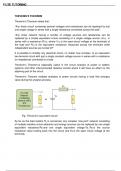
-
THEVENIN theorem
- College aantekeningen • 7 pagina's • 2024
-
peterkuria3
-
- $10.49
- + meer info
Thevenin's Theorem simplifies complex circuits into a single voltage source and a series resistor, allowing for easier analysis and understanding. It is essential for reducing complicated networks to simpler forms, facilitating easier calculations of current, voltage, and power across specific components, especially useful in practical electrical engineering applications.
PROVIDING THE COMPLETE NOTES OF BASIC ELECTRICAL ELEMENTS
PROVIDING THE COMPLETE NOTES OF CHAPTER RECTIFIERS WITH THE HELP OF PRACTICA PROBLEMS

Studiestress? Voor verkopers op Stuvia zijn dit juist gouden tijden. KA-CHING! Verdien ook aan je samenvattingen en begin nu met uploaden. Ontdek alles over verdienen op Stuvia




